The Story of Leslie & Noah
Tales from Lestville
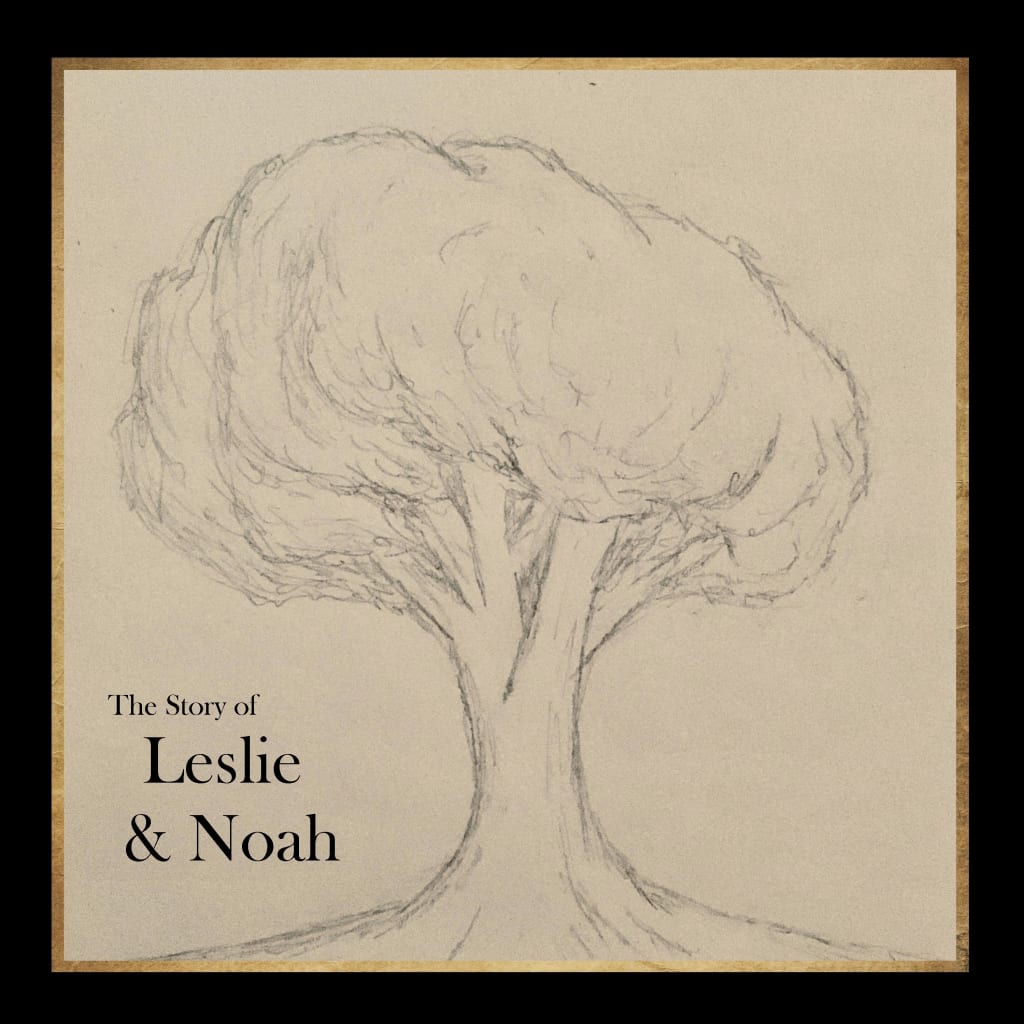
Listen to the official song of this story: "The Oak Tree"
Now available on YouTube, Spotify and Itunes.
***
"The Story of Leslie & Noah"
by Facundo Raganato
-----------
"My words are not dry when I remember you, their life is still blooming inside like they once shone." Noah admired the autumn leaves that stayed on the oak tree, and as he sat with the black notebook Leslie left behind, he chose to continue writing the story others will end.
"Literature carries messages through time," Noah said to his class one day. "To read is to bring forth our past for our future. We write what we care about, and we learn as we share our stories."
Bernard raised his hand and asked him: "What is your story, professor?" Denise looked at him. "My story is too long to be told, Bernard." Noah answered, smiling at the question. "You should write it down, professor." Denise said. Noah smiled again.
On the first day of each month, Noah would take an afternoon to go back to the places where he used to go with Leslie. There, he would sit to read what she described, and as he remembered, he wrote:
"Through my lessons I often think, what muses these writers must have had, to have written like this, then I remember your smile, L . . . and the answer speaks to me. Yet words are only the frame, and yours allow me to see. I continue our unfinished story as I sit here under our oak tree."
Time passed. And Noah wrote their story until the day of the earthquake. During the afternoon, the whole town of Lestville trembled, and for the people there, everything changed. Noah was at the bookshop when it happened; one of the wood beams from the ceiling broke and hit his head. He was taken to the nearest hospital, and although he was still alive, he went into a coma.
Denise and Bernard went to visit him as soon as they heard the tragic news. The doctor informed them that Noah had no family, so it was a blessing that they were here. She gave them the notebook saying:
"When they found him, he had this notebook in his hand."
Denise grabbed the notebook and opened it with Bernard; they recognized his handwriting, but not hers.
Bernard pointed to her unwritten name: "Who is 'L . . .'?"
"Perhaps it is the other writer." Denise said.
The doctor said that talking to patients in a coma helps to bring them back, so they decided to take turns to read the notebook to him.
Denise would read him what Leslie wrote.
Bernard would read him what Noah wrote.
They promised each other to read the notebook only when both were present. When one read, the other one would listen.
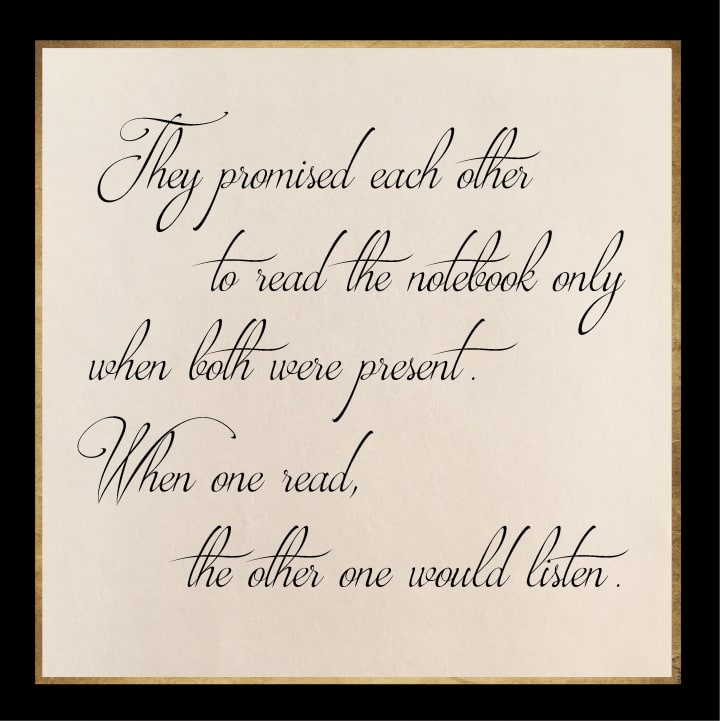
"Who would have thought," Denise read to him, "that the first kiss would be nothing like I imagined. I could feel the energy of his love through my lips. I had a sun of light inside me, silent harmonious music vibrating through me. Now I can't believe what this oak tree has become for us. Their branches so clear to the sky as my arms, and the roots so deep they grow in my heart."
"I couldn't sleep." Bernard read to him. "The day I kissed you for the first time was better than any dream. I remember wanting to close my eyes that night, and relive the moment, over and over again. I had tears of it happening then; I have tears of remembering now. My dream has become a memory."
Time passed. And the notebook became sacred for Denise and Bernard. They began to hide it so no one would find it. Members of the faculty, students, and close acquaintances came to visit Noah; they left tokens of good omens and prayers for him. Discreetly, the students asked those who knew him about his younger days, but none of them seemed to mention any clue about 'L . . .' He had always been very private about his life.
“The day we went to the river, you told me you loved me." Denise read. "I never said it that day, but I already loved you too. I wish I had said it now, but a knot came to my throat. I was scared, but of what? I don't know. Afraid of being vulnerable, I guess. Afraid of not knowing how this will end."
"I knew you loved me." Bernard read. "You didn't have to say it, I could see it in your eyes. The more you smiled at me, the more I loved you. I wish you could be here with me today, so I can tell you this; the same way you are telling me through your writings. I see the river now and notice how much Lestville has changed, the water is different, but the river is the same."
Bernard closed the notebook, and Denise asked: "Where do you think she's now?"
"I rather not say what I think." Bernard replied.
"Would you rather tell me how you feel then . . . ?" Denise asked. "She talks as if they are still here."
Bernard thought about what she asked, but then said:
"He talks as if she never left. She means the world to him . . . It seems like, through his writings, he is still trying to bring her back."
"It would be wonderful to meet ‘L . . .' at the oak tree." Denise said. "I would tell her. Do you think she will come to him if she knew he still loved her after all these years?"
Bernard looked at Denise sitting in front of him, thinking how his love for her could last many years as well: "Yes."
Denise examined the writings to find the places they both described, but Bernard chose to go to the cemetery alone instead. He thought maybe 'L . . . ' was buried there, but there was no way of knowing.
Only the places held the memories of their story. They recited the writings as if no one else in the world would ever read these words again.
"We got lost in the woods yesterday." Denise read. "We deliberately lost ourselves because we wanted to be alone. I prayed to God that morning. You asked me if I was ok because you thought I cried. Now I tell you that I did, but they were tears of happiness. I never imagined I could ever feel so loved."
"I remember that morning." Bernard read. "I read this after years and words cannot paint how grateful I am. Now I can close my eyes and be there. Being with you those days in the woods made everything feel so present; the quietness embraced us in the peace we shared."
"And how much I enjoy hugging you." Denise read. "In your arms everything feels safe. There's nowhere else I rather be.”
“L . . . You still linger within my thoughts,” Bernard read. “I still hold you with my poem, and kiss you when I remember. My soul still soars with your voice, through the words, through the cadence of the flow, my heart still beats watching the autumn leaves fall, the unforgotten memories that once bloomed at our tree. How much I remember, with the cold breeze, how much I relive how the wind blows."
Denise cried sometimes when Bernard read the notebook. "I think it is enough for today." She would say. "It is such beautiful writing, but I need time to process the words."
"I know what you mean." He replied.
Denise looked at Bernard from the back as he sat in front of her, near the professor. "It means a lot to me that you read with me, Bernard. How do you feel?"
He didn't look back to her, but said: "Words can't say."
Denise wondered why Bernard didn't want to go with her to the places written in the notebook. She thought about that unique moment some time ago, when she felt he wanted to kiss her.
When Bernard was alone with his professor, he said:
"I admire the courage of your writing professor, you see, Denise and I have been very close . . . There was a moment that I was going to kiss her, but the earthquake interrupted us, do you think that was a sign? . . . The other day I dreamt that I woke up and you were sitting next to me, as I am now." As he began to remember, he let his tears fall. "You told me that I shouldn't let my feelings sleep, that I should tell Denise how I feel, before it is too late. But what if our story is left unfinished? I don't want to love her in my past." Bernard hugged him, "I really wish you would come back."
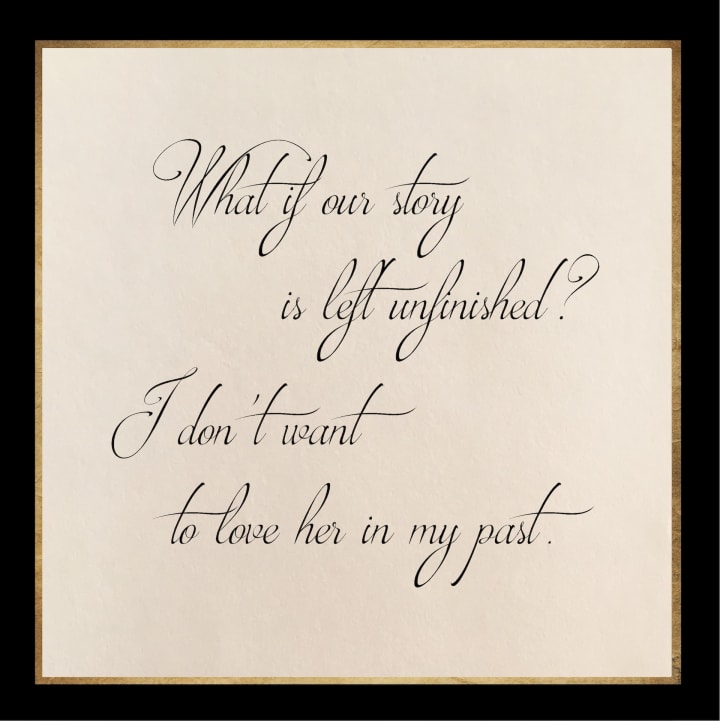
Time passed. And Denise read the last writings of the mysterious 'L . . .' as if these words were the last leaves that would fall from the oak tree:
"I want to keep writing in this notebook, but I only want to keep happy memories here. I'll leave my writings behind, but I'll keep my wish to return."
"Noah never wrote about this." Bernard said after listening to her. "He doesn't say what happens to her. His last writing is the day of the earthquake."
Denise gave the notebook to him: "What does he say?"
Bernard grabbed the notebook and searched for the page. But once he found it, he waited a moment before reading. His last words felt like dry leaves already on the ground:
"Remember when we used to visit the bookshop? This place has been open for generations in Lestville. Every time we came here was special and unique; I loved reading poetry with you, the words---"
In the silence that followed, they both knew that even if the writings were over, their story was not.
“We should visit his place," Bernard said. "Maybe there we can find out who 'L . . .' was.”
"Is." Denise marked. “I rather believe she’s still alive.”
From Noah's documents they could find where he lived, and from one of his pockets they borrowed his keys. They decided to go late at night, while the neighbors slept.
Their professor lived in a big house made of wood and stone, not far from the oak tree. They walked in with flashlights and searched the place without saying a word. There were more books than anything. They went through his desk and drawers, through papers and photographs, but there was no sign of 'L . . .'
He had a writing room upstairs with a forgotten typewriter on his desk, but when they checked the paper in it, it was empty. As they turned around to exit the room, Bernard pointed to the wall, and there was a large painting of the oak tree. Denise noticed his signature 'N.W.' on one of the corners. "Noah Williams." She said. "It's the same oak tree they described." At that moment, Bernard understood what they had to do: "I have an idea."
The next day, they returned the key to Noah, and sat with the notebook in his room to talk. "Denise, let me show you something," Bernard went through the pages of the notebook, and pointed to a paragraph near the end: "Read here."
Denise read what Noah had written: "I wish someday I could publish this, so this story can inspire those who love. Bernard asked me 'what is your story,' and I could not think of a time with more meaning in my life than when I was with ‘L . . .’ All those memories we have, all the experiences we lived, all the words that you wrote here in this notebook means everything to me."
"You want to publish the notebook?" Denise asked.
"Yes." Bernard answered, "We can publish it for him, under his name. It is what he would have wanted."
"Maybe he wanted it, but what about her? Let me show you what she wrote." Denise went through the pages to the middle of the notebook and pointed to what 'L . . .' wrote. "Here, read this."
Bernard grabbed the notebook and read out loud: "He tells me I inspire him so much, that I'm the flame of his poetry. He says he doesn't want to write stories about me because he's afraid of how to end them. I told him I wouldn't like to be in the spotlight, but if he ever wrote about me, I'd prefer to be 'L . . .'"
"You see? I don't think she wants to be exposed." Denise said.
"That is why we should publish it as it is, just 'L . . .' respecting her wishes." Bernard said. "We would be respecting both of their wishes."
"If she reads the book and wants to claim her credit, we must be sure that it is allowed." Denise said.
"Of course. She's one of the writers."
"And if we are doing this, Noah should receive all royalties; it wouldn't be right if we receive credit for something we didn't write."
"We would make it very clear to the publisher that he is entitled to all royalties as long as he is alive." Bernard said.
"What if he dies?"
Bernard thought for a second, and then he said: "Then everything he earns from the book will go to the literature department of the university, in honor to our professor Noah Williams."
"I admire this idea very much, Bernard, but-"
"But I can't do this alone . . . " Bernard said, "You have read what they wrote. I would not consider myself true to literature if I let the story in this notebook be forgotten. What about you?"
"I wouldn't either." Denise replied. "I'm amazed by how much you are willing to go with this."
"He told us once in class to think of the things we do for ourselves and how much that means to us." Bernard said. "And then he told us to think of the things we could do for others and how much that would mean to them."
"I remember that he told us once that life is too short to not take chances.” Denise said. “If a word comes to us we should follow it. Treasures are found by those who seek and write.”
Over the next few months, Denise and Bernard spent it typing the words from the notebook to clean paper. They took turns as well; one read as the other one typed. They respected every space, comma and period. They included Leslie's name as 'L . . .' Just as she wished, just as he wrote.
Once everything was typed, they hid the notebook with Noah's belongings to keep it safe, and took the typed copy of the story to the publisher of Lestville. They met with them, adoring the story and the story behind it. All the terms and laws were agreed upon according to their plan, keeping everything fair and square. Denise and Bernard would have to present the book on the premiere date if Noah did not wake up. So they wrote a prologue together to honor his professor and the mysterious 'L . . .'
"The Oak Tree" by Noah Williams had his painting on the cover.
Time passed. And the books were printed for the premiere. As the date approached, Denise and Bernard kept visiting his professor as always, hoping he would soon wake up.
Denise visited the oak tree and stayed there for hours. She glanced around to see if maybe someone would meet her there, but no one came. She kept wondering why Bernard would not come to see the places described. So one day, when she was alone, she spoke to the professor as well:
"You taught us once that the greatest love stories have tragic endings, but I wouldn't want yours to end like that, professor. Maybe this book can shine a good ending for those who read it." Denise caressed her own hands. "Meanwhile, I kinda have this story, but I think it's tragic that I don't know how to begin . . . when I talk to Bernard, he listens to me. He speaks to me without words and I understand . . . If he loves me as much I love him . . . I just wish he would let me know.”
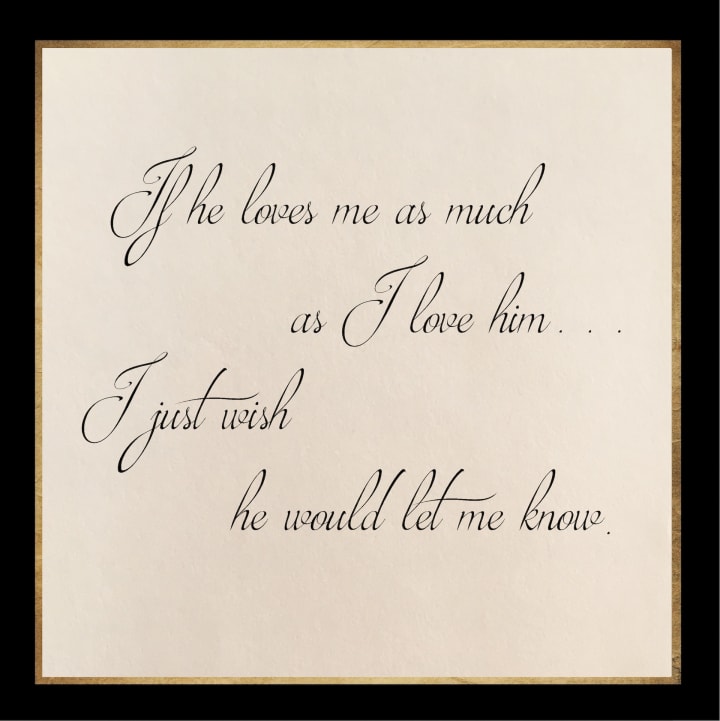
The premiere date arrived. Denise and Bernard presented the book at the local bookshop with a representative from the publisher. Everyone from Lestville gathered there to listen to what these two young literature lovers had to say. There were so many people that some of them stood outside looking through the window display.
They answered all questions from the audience truthfully and transparently, being very grateful for it all. "No. We don't know who 'L . . .' is." Denise answered. "I really wished to meet her for a long time, but I guess she would be the only one to decide, that is, if she's still with us. If you have information about her, please let us know only to Bernard and I. As you can see in the book she prefers to remain anonymous; we did our best to keep it as is. We ask this as a sign of respect for the story, for us, for Noah and for herself."
When they asked her: 'what does she mean to you,' Denise said: "She taught me about love, and I adored her writing voice because she expresses her hidden emotions."
And when they asked Bernard: 'what does Noah mean to you,' he said: "He is our favorite professor, he taught us so much about Life and Literature; through his classes and through his writings. We are doing this for him. We are doing this for the chance of giving their story the good ending they very much deserve.”
The news travelled far as the book sold internationally. It had an impact in many countries and people started requesting it in other languages.
Time passed. And one day Denise and Bernard were in Noah's room, reading letters that people sent about the book. And then, the door opened, and a lady came in. They noticed her walking with a copy of the book wrapped around her arms, close to her chest. She had the biggest smile on her face, and she was crying. The students were stunned as she approached, for they already knew who it was:
"Her hair was soft red like a warm flame. Her eyes were light brown like honey; sweet as they look. She was thin enough to be wanting to hold her. She was not tall as me, so I could put my arm around her. She always hid her ears behind her hair. She never used earrings nor any kind of jewelry, and she always wore opaque colors to remain unseen."
The lady walked to Noah, placed the book on the bed and grabbed his hand. She leaned in closely and said:
"Noah, it's me, Leslie."
Denise and Bernard saw how, in that moment, Noah opened his eyes. He woke up and Leslie was the first one there. In a very weak fainted voice he spoke: "Leslie."
She brought his hand to her heart: "Noah, how much I've missed you."
Bernard turned to Denise to see her in tears as well, so he quickly went to find the doctor without interrupting them.
"Leslie . . ." Noah said, smiling.
"I'm here."
The doctor came in with Bernard, and asked Leslie to step aside to see Noah. She checked on him and asked him questions to bring him in full consciousness. Leslie stepped to side with the book wrapped in her arms. Denise was still; she could not believe 'Leslie' was standing there besides her. Bernard took the lead and said: "We are grateful to finally meet you, Leslie."
"Bernard Richards . . . Denise Hawkins . . . " Leslie said. "It is such a blessing to meet you both."
Leslie and Denise hugged.
Bernard dried his eyes.
The doctor reclined Noah forward to talk to his visitors, saying:
"Noah has returned, but please be gentle with him, he still needs time to adjust."
Noah smiled as he saw Bernard, Denise and Leslie standing there. "I remember them, doctor. How long have I been absent?"
"You've been sleeping for 2 years, professor." Bernard said.
"We missed you." Denise said. "We didn't know what to do to bring you back."
"It seems like you did." Noah said as he saw Leslie standing there.
Little by little, Noah recovered to be as he was before, but as he took procedures with the doctor, Leslie went to the oak tree with Denise and Bernard.
They sat to enjoy the refreshing breeze of the day. "You two have given us so much life." Leslie said to them. "I cannot express my gratitude in words. This book is the story of my happiest days in life, and this oak tree means so much to us." Leslie kept silences between her words to feel the blowing wind and the fluttering of the leaves.
"We did not include your name, Leslie." Bernard said. "We thought it would be the right way."
"It was." Leslie replied. "When I saw the book, I recognized the painting," She touched the book's cover, "Noah painted it for me, but I had to give it back when I left. This was a long time ago. . ."
She let tears fall: "When I read your prologue, it felt like someone had cared for my life as much as I remembered. Reading my own words again was bringing back what I forgot."
Leslie took a moment to inhale the winter air. She closed her eyes when she cried, and then opened them to see the oak tree again. "Reading Noah's words made me cry of joy. He was writing the things I wanted to know when I was writing. Seeing how he was remembering and longing for our story was what brought me back."
"It was such a beautiful story to read, Leslie." Denise said. "We did what we did because we wanted it to have a good ending."
"And you both did." Leslie said. "But remember: our stories don't end without us, we create them. You two are young, you know this tree as well; its leaves dry during the winter, but it blooms again in spring. Its growth is connected to what makes it alive, and that never leaves us."
One morning, the four of them stayed to talk in Noah's room. The professor kept looking at the book with his painting on the cover, and every time he looked at it he smiled. "I have no words to express how grateful I am for such incredible people like yourselves. Denise, Bernard, you have not only made my dream come true, you have also saved my life."
"Leslie saved you, professor." Bernard said. "We just reached out to her with your own words."
Noah and Leslie also spoke between themselves without words.
"If you don't mind me asking, Leslie." Denise said. "Where did you return from?"
"From afar . . . " Leslie answered. "You see, Lestville is full of memories from my youth, and although many of them are beautiful ones, there are many that marked me strong."
Noah grabbed her hand as she told her tale: "I was with Noah when my parents separated. My mother wanted me to move to another country with her, but I wanted to stay. When she went away, my father and I were not the same family. Then, my father died, so even though I was in love with Noah, I had to go live with my mother. Time passed, and my mother got sick, so I stayed with her trying to build a life on my own. I didn't want to be in contact with Noah from afar, it would have killed me. I suffered when my mother moved away, so I didn't want to suffer again. You see, we create our own stories, but we never know what might happen in the plot, that is just how life is. So we must save the present, as best as we can."
"Professor, did you know Leslie's story?" Bernard asked.
Noah shook his head gently. "Not the whole story, Bernard. Leslie was always the beautiful girl I was in love with but had to move away. Neither of us had the heart to say goodbye. I found the notebook on my doorstep when she left. My writing was only for longing, it was for remembering a past I wanted to save."
"Now the story of your past has become your future, professor." Bernard said, ''The story is an inspiration to many, and with your book, you have earned over $20,000."
"I am beyond grateful and extremely lucky." Noah said. "It would be a great honor if you both accept what I want to give you in return, as a token of gratitude."
"With all due respect, professor, Bernard and I had decided not to receive any earnings from the book." Denise said.
"I want to create what you guys had to mind." Noah said. "I want to use part of the earnings to open a creative writing branch at the literature department of the university. And it would be an honor, if you two helped me develop it." Denise and Bernard smiled as Noah spoke: "You both have proved to your professor that you are great at telling stories."
Denise turned to Bernard with a smile, and she answered on his behalf. "It would be an honor, professor. Anything for the sake of literature."
Leslie told the students that she wanted to give them a present as well, but they had to go to the oak tree at sunset. And that is what they did.
When Denise and Bernard arrived at the oak tree, Leslie was not there. As they walked around it, Denise found a black notebook on the grass. "What's this?" She picked it up and opened it to see it blank. Bernard got close to her to see; understanding what the present meant. And there, without any words left to say, he kissed her.
The End
***
Written by Facundo Raganato
www.TheCharactersShortLivingStory.com
~ Listen to the official song of this story: "The Oak Tree"
Now available on YouTube, Spotify and Itunes. ~
***
Read another Tale from Lestville here: "The Story of Giselle & Damian" *
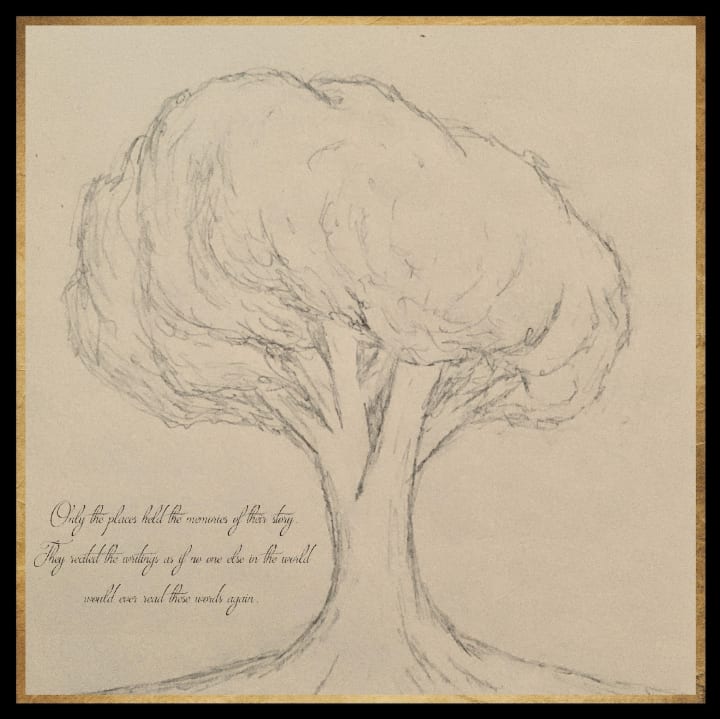
About the Creator
Facundo Raganato
Author, Composer, Artist, Alchemist, Designer,
@FacundoRaganato
www.thecharactersshortlivingstory.com






Comments
There are no comments for this story
Be the first to respond and start the conversation.